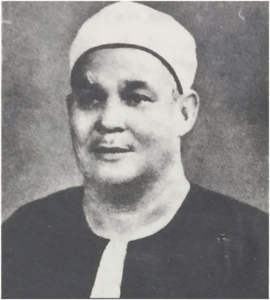The Trodden Path (Episode 5): A Glimpse At the Lives of the Illustrious Scholars and Saints of the 20th and 21st Century.
In this series, Shaykh Shoayb Ahmed of South Africa will take us on a journey through the lives and biographies of some of the most celebrated and well known scholars of the twentieth and twenty – first century. These historical accounts will provide us with refreshing insights and lessons, and motivate us to follow in the footsteps of our pious predecessors.
In this fifth episode of the The Trodden Path series, Shaykh Shoayb Ahmed writes on the life of Shaykh Muhammad Abu Zahra
Shaykh Muhammad Abu Zahra 1316-1397=1898-1974 (Egypt)
Muhammad ibn Ahmad ibn Mustafa, Abu Zahra was born in the city of Al-Malla Al-Kubra in Egypt in 1898 (1316).
As a young boy, he studied at the Al-Ahmadi Mosque in Tantaa, where he memorized the Quraan and some basics in the Islamic Sciences.
Then he joined the Shariah School, from which he graduated with excellent results in 1924. His certificate was equivalent to that of the Cairo Darul Uloom.
He taught Arabic and some Islamic subjects at the Darul Uloom and at the Faculty of Usul-Deen at the Al-Azhar University, as well as at the Faculty of Law at the University of Cairo.
He also occupied the position as lecturer for post-graduate studies from 1935 (1354). He was a member of the Higher Council for academic research and Head of the Shariah Department. He was the Deputy of the Faculty of Law and the Institute for Islamic Studies.
Hundreds of ulama from all over the world studied under him and it was he who established the Shariah Department at the University. He used to deliver lectures and lessons without any remuneration. He was invited to many parts of the world to deliver talks and to participate in seminars and Fiqh academies.
He contributed greatly to the Islamic World through the many books he wrote. His books are about eighty in number some of which are volumes; these are in addition to the many articles and fatawa he issued.
Some of his most famous books are: (titles translated from Arabic)
- Discourses on the History of the Islamic Schools of thought.
- Lectures on Christianity
- The Life of the Prophet Muhammad and Biographies of Imams Abu Hanifah, Malik, Shafi’, Ahmad ibn Hanbal, Ibn Hazm, Ibn Taymiyah, Zaid ibn Ali and Jafar Al-Sadiq
- The Laws of Inheritance and Succession
- Muslim Personal Law
- Usul-Fiqh
- Studies in Riba (Interest)
- Islam’s planning of the Society
- Crimes and Punishment in Islamic Jurisprudence
- A Commentary on the Laws of Bequest
- International Relations in Islam
- Discourses on Marriage and the Contract
- Discourses on the Laws of Endowments
- Lectures in Comparative Religion
- Lectures in Jafari (Shia) laws of Inheritance
- The History of Dispute and Argumentation in Islam
- Social Insurance in Islam
- A Book on the Manner of Delivering Khutbah’s
- The Encyclopedia of Islamic Jurisprudence
Shaykh Abu Zahra was known for his courage for the truth. He was a very honorable and kind hearted person. He possessed a strong memory and the ability to invent and think of new things. He debated with clear and strong proof. In his era, people were pre-occupied with his writings and his views in Fiqh. He was willing to oppose any deviant idea, as well as those who were the students of orientalists or were influenced by secularist ideas.
The ruler of Egypt at the time issued an order that prevented Shaykh Abu Zahra from teaching at the University and from delivering any talks in the mosques. He was even prevented from speaking on the radio or appearing on television or even writing for newspapers. Instead many of the smaller newspapers were encouraged to attack his character and personality.
In an interview with Shaykh Abu Zahra in December 1960, he was asked about what should be done regarding a leader who assisted in corrupting the country and whether he should he be obeyed?
He replied, “Indeed Allah does not love evil and corruption, the worst of leaders is the one promotes evil and corruption. Any leader who does this, then his punishment is Jahanam, because authentic Hadith have been reported wherein the Prophet prohibited the chopping of trees and plundering of land during war even if it were in enemy territory. So how can such acts be permissible in the land of Islam?
Those who do that deserve the punishment of highway robbers and those who support them deserve the same punishment.”
He strongly opposed those Muslims who were influenced by foreign and western ideas that stated that a country couldn’t be established on religious principles.
He fought all attempts by the government to distance the Shariah and re-structure it to suit their desires. He participated in a number of debates with the government in which he always emerged victorious. He opposed the government’s proposal to adopt family-planning. He also resisted the Socialists and he annulled the fatwa passed by some permitting some forms of interest.
The government’s attempts to silence him, whether peacefully or by force were all unsuccessful.
On one occasion, an arrogant judge opposed Shaykh Abu Zahra and criticized his books. The Shaykh replied that these books were written for the pleasure of Allah, they were not prescribed to anyone, and neither did any government take the responsibility of distributing it.
He was once invited to a large Islamic Conference together with a number of prominent ulama from the Muslim World. The president of the host-country was an oppressive tyrant who in his opening address at the Conference spoke about the ‘socialism’ of Islam. The President called on the ulama to support him and to proclaim this as being the truth. Many were helpless and bewildered. Shaykh Abu Zahra asked for a chance to speak. He said: “We, the ulama of Islam, who know the law of Allah in matters of the country and in matters related to peoples’ problems, have come here to proclaim the truth as we know it, so the leaders of the countries should stop within their limits and they must leave Ilm for its people so they may openly proclaim the truth. You have been kind to invite the ulama and now you must listen to their views so that you don’t pronounce a view that they regard as incorrect. We ought to fear Allah regarding his Shariah.”
The President of the host-country was alarmed and afraid, so he requested that one of the scholars stand and defends him against Shaykh Abu Zahra. No one complied and the conference was abandoned after the first sitting, when the President stormed out of the hall.
Shaykh Abu Zahra passed away in Cairo in 1974 (1397) and the Janazah Salaat was led by the Shaykh of Al-Azhar, Shaykh Muhammad Al-Fahaam.
Abdullah Al-Aqeel praised him in a speech after his death where he said, “Allah has chosen Shaykh Abu Zahra, a brave man, an excellent scholar, a prominent jurist and a mujtahid, a very intelligent person who spent his life serving Islam…”
Dr. Muhammad Rajab Al-Bayoomi said in his book, that Shaykh Abu Zahra was the refuge and solace for the scholars in any crisis. He was sharp-witted, very eloquent and very strong and convincing in his arguments. He was known for his sincerity and his harshness against the oppressors. He was pressurized, but he never succumbed.
Shaykh Salih Al-Jafari, Imam of the Al-Azhar, also commemorated his death by speaking about Shaykh Abu Zahra and his personality.
Shaykh Shoayb Ahmed is a well respected South African Islamic scholar who lives in Pretoria, South Africa. He studied at the King Saud University in Riyadh and the faculty of Shariah at the Islamic University of Madina. He has attained a M.A. in Islamic Studies from the University of South Africa. Through his extensive travels he has met and benefited from many senior scholars from Saudi Arabia, Morocco, Egypt, Syria, India, Turkey etc. He has received numerous Ijazahs from the various scholars that he has met, studied with and served. He is currently a senior educator at the al – Ghazzali College in Pretoria.
He has authored two books:
- Muslim Scholars of the 20th Century.
- Muslim Scholars of the 21st Century.
He was one of the translators of Shaykh Sayyid Muhammad Alawi al – Maliki’s work: The Way of the True Salaf.

